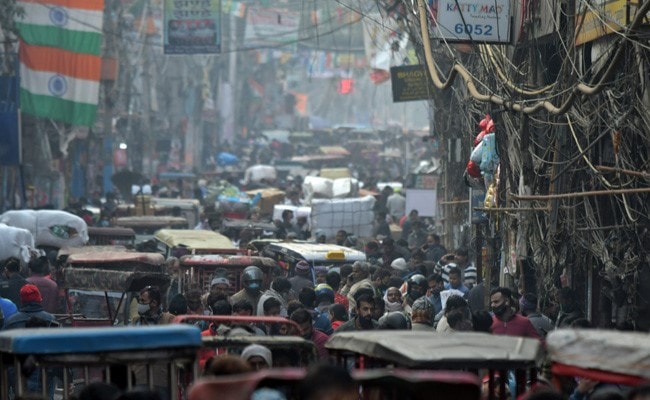
A huge number of people were seen at public places in Delhi on the first day of New Year on Saturday with few wearing masks and even fewer showing any caution amid growing coronavirus cases due to the new coronavirus variant Omicron.
Long queues of commuters were seen outside Rajiv Chowk Metro Station in Connaught Place despite curbs in the national capital.
Anticipating a huge rush of commuters on the New Year's Eve, Delhi metro authorities restricted exit from Rajiv Chowk metro station after 9pm on Friday.

People stand in queues outside Rajiv Chowk Metro Station, at Connaught place, in New Delhi
"To ease overcrowding on New Year's Eve (31st December, 2021), exit from Rajiv Chowk metro station will not be allowed from 9 pm onwards. However, entry of passengers will be allowed till the departure of the last train from the station. Commuters are requested to plan their journey accordingly," the DMRC said in a statement on Thursday.
#WATCH | Long serpentine queues of commuters seen outside Rajiv Chowk Metro Station as revellers throng to Connaught Place on the #NewYear
— ANI (@ANI) January 1, 2022
Delhi metro trains are running at 50% capacity under the 'yellow' alert issued to curb the fresh wave of #COVID19 infections pic.twitter.com/joLB8uO8Bv
Besides Connaught Place, large crowds were seen at city's popular spots like Sadar Bazar Market, Red Fort since the morning.

People seen in large numbers at Delhi's Sadar Bazar Market, violating COVID-19 appropriate behavior amid the spike in cases on New Year's Day
On New Year's eve, the Delhi Police made announcements in Connaught Place asking people to go home before night curfew kicks in.

People are seen outside Red Fort on the first day of New Year 2022, in Delhi
Delhi Deputy Commissioner of Police Deepak Yadav said, "We started imposing restrictions post 7 pm in Connaught Place and markets were closed by 8 pm. Only some restaurants have permission to stay open till 10 pm. The staff has been directed to take actions in case of unreasonable movement during night curfew or drink and drive cases."

Police personnel stop as commuters standing in a queue wait to enter the Rajiv Chowk Metro Station
A "yellow" alert under the Graded Response Action Plan (GRAP) was sounded by the DDMA on Tuesday, which entails the running of DTC buses and metro trains with 50 per cent seating capacity and no provision for standing for commuters.
Delhi recorded a massive surge in daily COVID-19 infections with 2,716 fresh cases on the first day of the new year, the highest since May 21 and a 51 per cent jump from a day earlier, while the positivity rate rose to 3.64 percent. The city recorded one death.
Track Latest News Live on NDTV.com and get news updates from India and around the world

